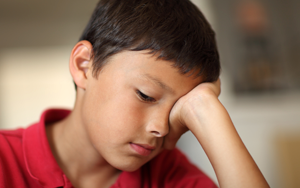 According to the American Academy of Child and Adolescent Psychiatry about 5% of children and teens suffer from depression serious enough to interfere with normal functioning. And, not surprisingly, children with learning disabilities have higher rates of depression than their non-LD peers.
According to the American Academy of Child and Adolescent Psychiatry about 5% of children and teens suffer from depression serious enough to interfere with normal functioning. And, not surprisingly, children with learning disabilities have higher rates of depression than their non-LD peers.
Dr. Betty Osman, author of Learning Disabilities: A Family Affair, is a psychologist whose specialty is treating children with LD. She maintains that depression comes from the disparity between what these kids are able to do and what they should be able to do. Add to that the enormous pressures of school, and she concludes, “There’s an awful lot of kids who are feeling totally overwhelmed.”
Red-Flag Behaviors
Recognizing the signs of depression in your child is not always easy. Standard signs for children (and adults) include lethargy, changes in eating patterns, or sleeping difficulties. But other indicators include:
- Decline in school performance
- Social withdrawal
- Excessive moodiness
- Irritability
- Low energy
- Lack of interest in previously enjoyed activities
“On the flip side,” notes Dr. Osman, “some children act in an almost hyperactive way to mask their depression. If you’re really busy, you don’t have time to be depressed.”
What You Can Do
Although your child may not be able to verbalize his depression, if you have concerns consider the following actions:
- Validate feelings. Listen when he becomes frustrated, validate his feelings and praise his efforts, saying, “I’m glad you can tell me how you feel, and I’m sorry, but I know we can help.” It also helps to put a time limit on his pain, reassuring him this won’t last forever.
- Work with the school. Talk to his teacher to determine the level of school pressure; try to work out a more manageable schedule.
- Provide healthy outlets. Consider offering more sports, art, acting, and exercise. Help him discover his own interests and nurture his passion.
- Seek Professional Advice. If symptoms continue for more than a couple of weeks, ask your pediatrician, school counselor, or school psychologist to recommend a professional therapist with whom you can talk about your concerns.

